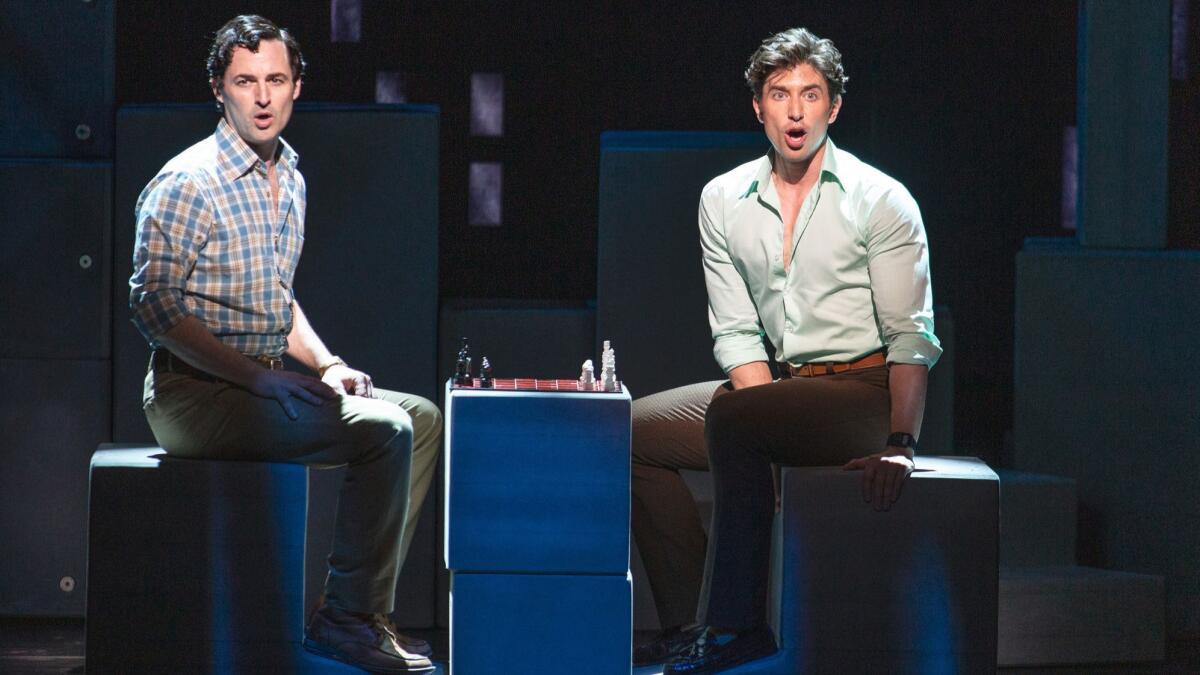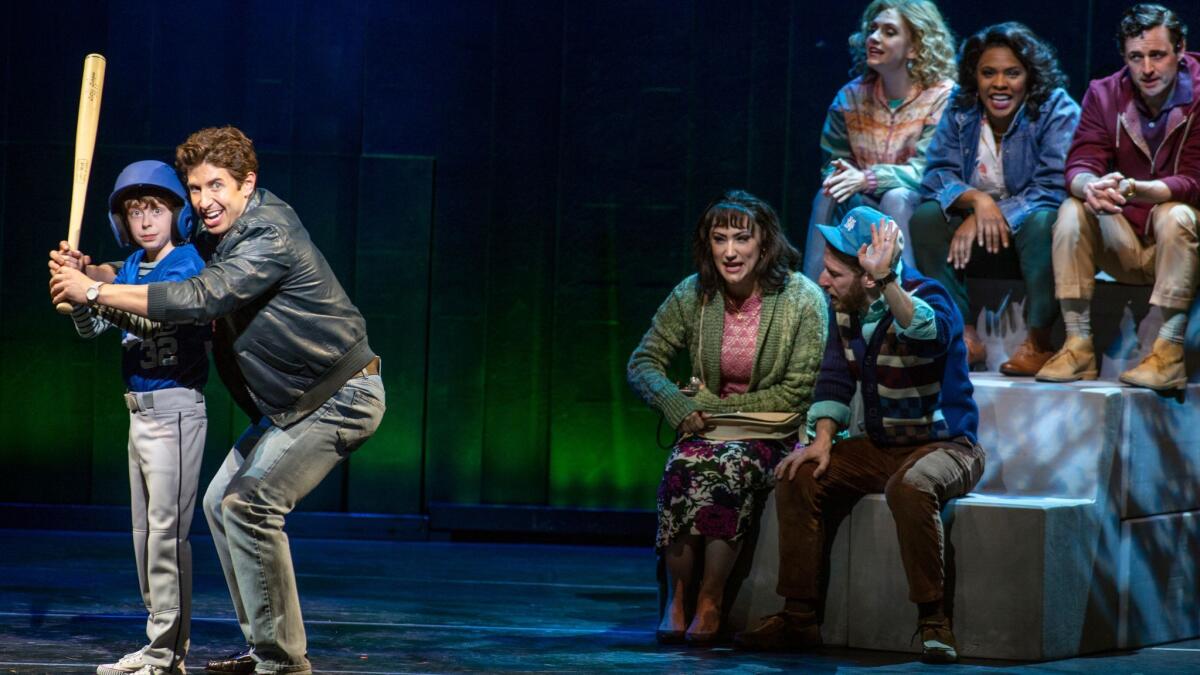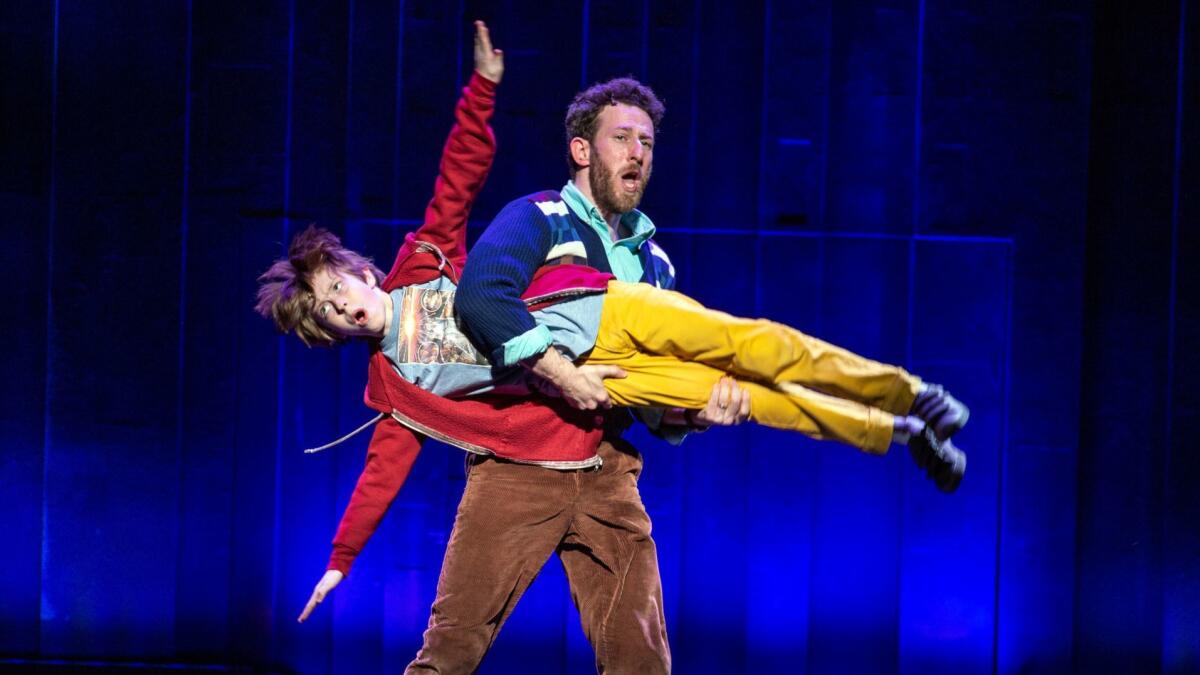Review: ‘Falsettos’ sings life’s frantic melodies at the Ahmanson

- Share via
The first half of the musical “Falsettos” is set in 1979, the second in 1981 — years when Marvin, who leaves his wife and son for a man, was on the wrong side of sodomy laws in a number of states and didn’t have a lot of rights he could count on.
Yet from the start, he emphatically sings: “I want a tightknit family / I want a group that harmonizes / I want my wife and kid and friend / To pretend / Time will mend / Our pain.”
He adds: “I swear we’re gonna come through it. / I fear we’ll probably fight.”
And fight they do. Discord, heartache and resentment routinely erupt. Yet although one family is pulled apart, it keeps rearranging into new forms and remains, quite resolutely, a family.
This warts-and-all depiction of daily life makes “Falsettos” remarkable. Also exasperating. But the honesty is refreshing in the post-Broadway touring production that’s visiting the Ahmanson Theatre in downtown Los Angeles.
“Falsettos” emerged from three one-act musicals: “In Trousers” (first seen in 1979), “March of the Falsettos” (1981) and “Falsettoland” (1990). The story, music and lyrics are by William Finn, who later delivered the delightful “The 25th Annual Putnam County Spelling Bee.”
James Lapine — Stephen Sondheim’s collaborator on shows including “Sunday in the Park With George” — directed the premieres of the second and third Marvin musicals and co-wrote the third. Those two were packaged as “Falsettos” and graduated from off-Broadway and regional productions to Broadway in 1992. Lapine, who also directed the 2016 Broadway revival of “Falsettos,” is credited as the combined show’s co-writer.
Those who haven’t seen the piece since its 1993-94 swing through the Southland might wonder whether it’s become dated. Nope, not at all. There will always be Marvins and Trinas (his wife) and Jasons (his preteen son) in the world, getting on one another’s nerves, coping with disruptions, crawling out from beneath grief.
The show itself, though, can be a challenge. It’s a series of songs with no connecting dialogue, so the storytelling is elliptical. Your ears must be on high alert at all times. Add to that melodies that, in capturing the characters’ neuroses, are often jumpy and frenetic. Plus: All these sharp-edged personalities put some people off.
I’ve seen “Falsettos” with friends who’ve laughed and sniffled through it and with others who’ve been restlessly, audibly frustrated. Either response is understandable.
But when the agitated melodies relax into lyricism — oh, my. The music and words reach deep inside and trigger all sorts of emotions.
Marvin is a yuppie-era New Yorker, ambitious and financially secure. Although he’s gone off to live with Whizzer, he insists that Trina, Jason and Whizzer spend quality time together. Marvin is in therapy — no surprise. Trina soon heads there too — to the same psychiatrist, Mendel — and precocious Jason is urged to do so as well.
The youngster acquiesces, even though he is perhaps the wisest and most self-aware of the bunch, watching the adults in bewilderment.

Life becomes “fights and games,” as the lyrics put it. Trina cries and laughs uncontrollably while trying to prepare dinner in the tour-de-force “I’m Breaking Down.” Various characters repeatedly declare, “I never wanted to love you” and “This had better come to an end.” Then, just when Marvin might be on the verge of fitting the pieces of his life back together, he ends the first half by sending it crashing down.
David Rockwell’s set leaves the stage mostly bare except for a giant cube that pulls apart into Jenga-like pieces that the actors form into furniture arrangements and doorways. A frustrated push from Marvin topples everything.
Characters often remain onstage when they’re not in a scene, tossing comments from the side. Jennifer Caprio costumes them in primary colors brighter than most people would dare wear in real life. Choreographer Spencer Liff sends everyone into fits of giddy or distressed movement.
What we’re watching feels like a dream awaiting our analysis.
The second half, by contrast, relaxes into pastels and somewhat more civil behavior. Marvin declares, “It’s about time, don’t you think? / It’s about time to grow up.” He and Whizzer have split; preparations for Jason’s bar mitzvah frequently put him at odds with his ex-wife. But, yes, everyone seems to be growing up.
Under Lapine’s beautifully calibrated direction, the action becomes ever more realistic and Marvin finally seems happy as he sings the score’s most ravishing number — the hushed, lullaby-like love song “What More Can I Say?” — to the sleeping Whizzer, whom he’s managed to find his way back to.
The next moment, their doctor neighbor is singing “Something Bad Is Happening”: “Bachelors arrive sick and frightened. / They leave weeks later, unenlightened.” And, because this is the early ’80s, we fear what that means.
The cast arrives bearing solid Broadway credits, but the only names you might recognize are Eden Espinosa, one of the better-known Elphabas in “Wicked,” as Trina, and Max von Essen, a featured actor Tony nominee for “An American in Paris,” as Marvin. Both have rich, focused voices that alternately quiver with disquiet and soar with hope.

L.A. THEATER: Our weekly column on what’s opening »
Nick Blaemire is a treat as playful, funny Mendel. As Jason, Thatcher Jacobs (appearing at Wednesday’s opening, one of two young actors in the role) combines a strong boy soprano voice with just the right eye-rolling, give-me-a-break, preteen attitude. Nick Adams’ Whizzer might be vain, a bit flighty — and not a big fan of monogamy — but he’s a stalwart and compassionate additional father figure.
A band of four, led by P. Jason Yarcho, performs from a platform behind the set.
Events cause everyone in Marvin’s life to realize, as Trina puts it: “Life is never what you planned / Life is moments you can’t understand.”
But they all want more.
=====
‘Falsettos’
Where: Ahmanson Theatre, 135 N. Grand Ave. L.A.
When: 8 p.m. Tuesdays-Fridays, 2 and 8 p.m. Saturdays, 1 and 6:30 p.m. Sundays (some exceptions); ends May 19
Tickets: $30-$145 (subject to change)
Information: (213) 972-4400, centertheatregroup.org
Running time: 2 hours, 40 minutes
Support our coverage of local artists and the local arts scene by becoming a digital subscriber.
See all of our latest arts news and reviews at latimes.com/arts.
More to Read
The biggest entertainment stories
Get our big stories about Hollywood, film, television, music, arts, culture and more right in your inbox as soon as they publish.
You may occasionally receive promotional content from the Los Angeles Times.











